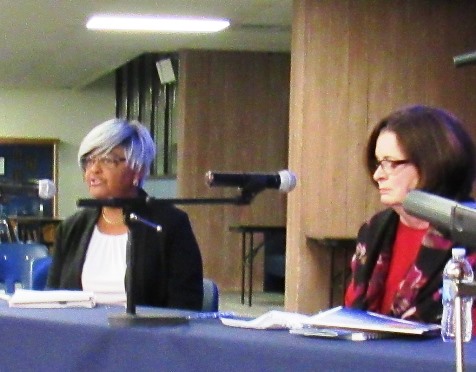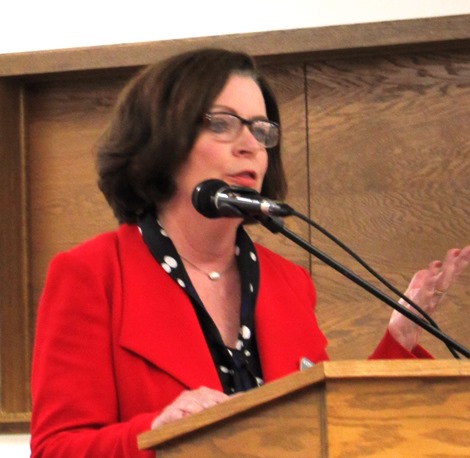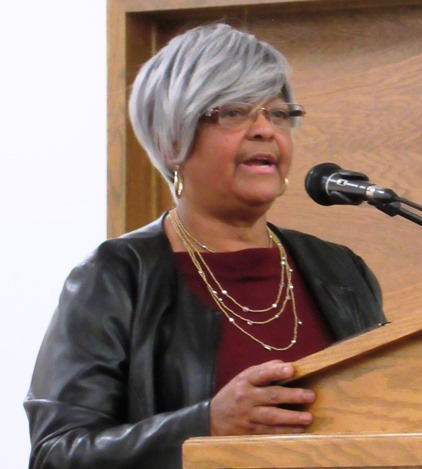
by Mary Rupert
Candidates for the 36th District, Kansas House of Representatives, support different positions on school finance and other issues.
Election Day is Tuesday, Nov. 6, and the 36th District is the only state representative contest in Wyandotte County where a Republican has filed against the incumbent Democrat. The 36th District is in the northwest part of Wyandotte County.
Incumbent Rep. Kathy Wolfe Moore, D-36th Dist., in office for eight years, is the business director at the University of Kansas Hospital. She faces Chiquita Coggs, a Republican, in the general election. Coggs, who has been executive director of the state Board of Cosmetology since 2011, is a conservative who advocates reduced spending. The candidates discussed several issues in a candidate forum held Oct. 18 at Kansas City Kansas Community College.
Rep. Moore said the decisions in the Legislature are not always easy, but she does the best she can. She will work with others who have different views than hers.
“I believe we have to change the culture of politics,” Rep. Moore said. “I believe in fairness, I believe in being civil, I believe in listening to one another, and compromising when you have to, at times.”
Rep. Moore said the Kansas Legislature must address fixing the school finance plan right away, as the Legislature is under an order from the Kansas Supreme Court to do so. Rep. Moore said she also supports efforts to lower the state sales tax on food.

“We have a lot to do in Kansas,” Rep. Moore said. “The last eight years were unkind to Kansas under the Brownback administration. Things are beginning to turn around, but we’ve got several issues that we have to address immediately in this coming year.”
When asked whether she supports increased funding for schools, she said she did. “Education is the way out of poverty,” Rep. Moore said. The Kansas Supreme Court has ruled that additional money has to be added, including enough to cover inflation in the coming years, she said.
Coggs had another viewpoint on school funding.
“I am not necessarily in favor of throwing more money into the education system,” Coggs said. “I think what we need to have as a better question, is whether or not we will provide some mechanism for accountability for our schools.
“We have continually over the past decades thrown more money into the school system, but our student achievement is not necessarily improving relative to the money we’ve been throwing at it,” she said.

“I think that we also need to step back to Article 6 of our Kansas Constitution giving the authority to allocate money, appropriate money to the Kansas Legislature, where it appropriately belongs,” Coggs said.
Other issues
On the question of school vouchers, Coggs said she believes parents who are putting their children in schools should have some sense of accountability and some sense of knowing their children will be educated.
Coggs said for students in a low-performing school, the parents’ tax dollars or gifts from businesses and taxpayers to the voucher system would be an excellent way to provide movement for students to a different school.
Rep. Moore said she has not supported the voucher system. Her children attended parochial schools, and she believes because it was her choice, it was up to her to bear the cost.
“Additionally, I think it would only do further damage to our public schools,” Rep. Moore said.
When asked if she supported increased funding for public higher education in Kansas, Coggs said she was having a problem with having a state fund or revenue stream that is overly burdened by all the budget requests it gets.
“Until we have some stability in our revenue, we shouldn’t think about increasing taxes for anything, or increasing appropriations for anything,” Coggs said. “If you were in your own home, and one of your partners lost a job, you wouldn’t start spending more, because you had less income. I think we need to stabilize our revenue before we think about increasing appropriations for anyone.”
Rep. Moore said she believes strongly in higher education as the way up and the way out.
“What’s happening, because of the cuts to higher education, some kids are getting priced out of getting a college education, so I believe we absolutely have to support our universities,” she said. “Additionally, I think what’s going on in our high schools, the partnerships between the community colleges and the high schools, is just excellent.”
Now students can come out of high school with as much as 30 hours of college credit, she said, which will help reduce the overall college expense. She said she was a big supporter of higher education and the programs to keep prices down, so every child has a chance to go to college or technical school if they want to.
When asked about school district consolidation or reduction of school administrative costs, Rep. Moore said consolidation has had a positive effect here on the local city and county government. But in western Kansas, school consolidation might require students to be on a bus for an hour or more, which is too long and not the right thing to do, she said. A better approach might be to consolidate some things districts do, such as purchasing equipment and supplies, she said.
Coggs said a lot of areas are looking at consolidation currently.
“We have a top-heavy administration in a lot of our school districts, and that’s a bit more of a problem than it is with the schools’ consolidation,” she said. “If we can keep children in schools close to home, I think that’s a good thing. If we lower the costs of administration, I think that’s a good thing.”
The cost of school administration across the state is increasing at a higher rate than the students, and there is something wrong with that, she said. “Cutting administrative costs is more important than consolidating districts,” Coggs said.
When asked what changes they might support in the Kansas child welfare system, Coggs said she knew the system had problems, and it was an issue she would have to delve into further to give an educated answer. She was very interested in finding an answer to the problems.
Rep. Moore said so much money had been stripped out of the foster care system, that there aren’t enough social workers.
“It’s all about caseloads,” Rep. Moore said. “The social workers are tasked with way too many families to be responsible for, and that’s terrible for the children, terrible for the social worker, and drives social workers away from wanting to work for the state government. So we have to do a better job.”
A foster care task force is looking into the problems currently, and has found that the caseloads have to be fixed, and there has to be better oversight, Rep. Moore said.
The candidates also talked about helping people who have been unemployed for a long time.
Better training for the work force will help persons who are unemployed, Rep. Moore said. Providing transit and affordable quality child care, which are barriers to people who need jobs, also will help, she said.
Coggs said a public-private partnership creating facilities for people to train for specific jobs in specific companies would help people gain work skills, get paid and train for jobs.
When asked what could be done to stimulate economic development in eastern Kansas City, Kansas, Coggs said there is land available that is underutilized, and they could work with opportunity zone programs.
Rep. Moore said there was a good start on the eastern part of Wyandotte County, with the KU Health Systems building downtown, the new grocery store downtown and young people moving back in. If there is a trained work force, that will attract more businesses to the community, she said. Federal opportunity zones could make a difference in the downtown and eastern part of the community.
On the question of immigration reform, which is a federal issue, Rep. Moore said she would encourage her U.S. representative to get things done on the issue. Immigrant workers are important to the farm economy and other parts of the economy, including the western part of the state, she said.
Coggs said immigrant workers are important to the economy of any area of the state.
“What we have to focus on is making sure those immigrants that we’re working with, that we’re doing so from a legal perspective,” Coggs said. “My focus would be on legal immigration, for setting up a mechanism to make sure that those immigrant workers who would like to remain in this country and become citizens, that they have every opportunity to do so. It can be a burden on our economy if we have people that are not supporting the goals that we have, the finances and the economic system, it can be a drain on our society. But at the same time, if it is being done legally, it’s certainly a boost to our economy and our community.”
More about the candidates
Rep. Moore grew up in Wyandotte County, attended local schools here, including Kansas City Kansas Community College, and received bachelor’s and master’s degrees from the University of Kansas.
She is the business director at the University of Kansas Hospital, and previously was the chief of staff for 10 years for former Mayor Carol Marinovich. Rep. Moore currently serves on the board of directors for Wyandot Center, in the mental health field. She also was chairman of the board last year of the Wyandot Economic Development Council last year, and continues as a board member this year.
Rep. Moore said her passion is service to the community.
Rep. Moore is the ranking minority member of the House Appropriations Committee, and also serves on the Legislative Budget Committee, the Joint Committee on Special Claims Against the State, and the Taxation Committee.
Coggs, a native of Kansas City, Kansas, is a graduate of Sumner High School and Kansas City Kansas Community College, and also holds a bachelor’s degree in business administration and a master’s degree in industrial organizational psychology.
She is the executive director of the state Board of Cosmetology, and was appointed in 2011 by then Gov. Sam Brownback.
Coggs said she is running for office to participate in civic government. Her passion is in education, she said, and she founded a charter school formerly in Kansas City, Kansas. She has a goal of working toward continue to working toward whatever would make charter schools successful in Kansas.
Coggs also is the past secretary of the Kansas Black Republicans, and is a past executive director of the North East Business Association Inc.
Coggs ran in 2010 for the 35th District, which was won by Rep. Broderick Henderson.
Campaign finance
Rep. Moore’s Oct. 29 campaign finance report showed that her campaign had $37,352.25 cash on hand as of July 27. Total contributions from July 27 through Oct. 25 were $21,830, for a total of $59,182 available to spend during this period.
Total expenditures from July 27 through Oct. 25 for Rep. Moore were $28,110.65, and the cash on hand as of Oct. 25 was $31,071.60, according to the campaign finance report.
Rep. Moore’s campaign finance report showed several donations from political action committees of groups including the Kansas AFL-CIO Cope Fund, Kansas New Energy Economy PAC, Kansas State Firefighters PAC, Farmers Employee and Agent PAC, Everytown for Gun Safety AF, the Mainstream PAC, International Association of Fire Fighters PAC, Kansas Hospital Association PAC, Kansas National Education Association PAC and other groups, as well as individuals.
Coggs’ campaign finance report from Oct. 29 showed cash on hand on July 27 of $401.98, with total contributions from July 27 through Oct. 25 of $7,828.89, for cash available of $8,230.87 during the period through Oct. 25.
Total expenditures for the Coggs’ campaign were $7,178.27, with cash on hand of $1,052.60 as of Oct. 25.
The Coggs campaign contained many small donations from individuals, as well as a $1,000 donation from the Wyandotte County Republican Central Committee, and a $100 donation from State Sen. Steve Fitzgerald.
More information
Other issues also were discussed at the candidate forum, which was sponsored by Business West, KCKCC and neighborhood business revitalization groups.
A video of the forum is online at https://www.youtube.com/watch?v=PG8N3-hfKXo.
The forum video is also running on the college’s cable television station, Spectrum Cable Channel 17, and Channel 146 on Google TV.
The remaining times for the 36th District video on cable TV include:
Nov. 2
10:30 a.m.: House of Representatives District 36
6:30 p.m.: House of Representatives District 36
Nov. 3
10:30 a.m.: House of Representatives District 36
6:30 p.m.: House of Representatives District 36
Nov. 4
10:30 a.m.: House of Representatives District 36
6:30 p.m.: House of Representatives District 36
Nov. 5
10:30 a.m.: House of Representatives District 36
6:30 p.m.: House of Representatives District 36
